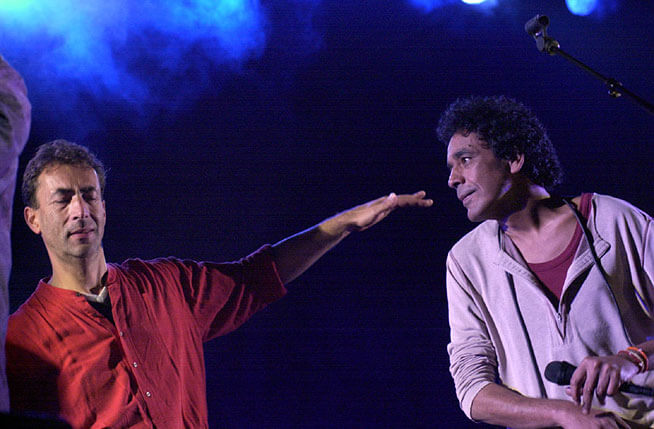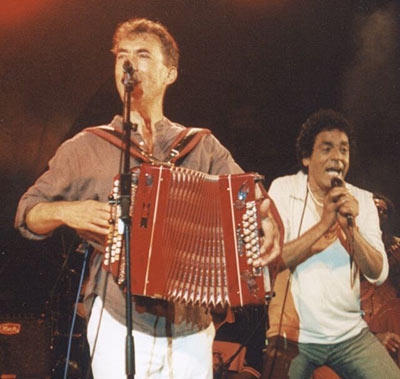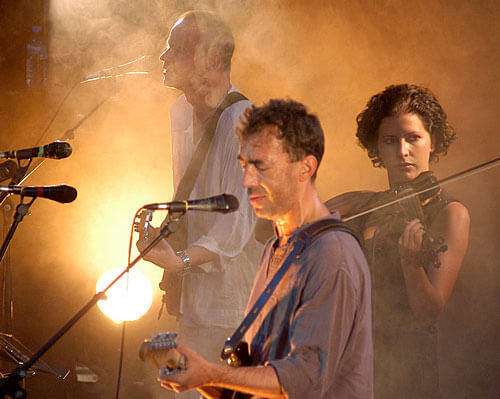GRENZENLOS TOUR 2003
Fast Afro rock with yodelling
Hubert von Goisern and Mohamed Mounir concert in the Münchensteinpark
Waldshut-Tiengen. What do an alpine rocker from Austrian and a pop star from Egypt have in common? Perhaps, that they both draw from a rich musical culture. That they are, each in their own way, equally critical people. And, naturally, bring along an unrestrained enthusiasm, even if they express themselves quite differently at the joint concert between Hubert von Goisern and Mohamed Mounir, with which they appear at the Stimmen festival in front of about 1,200 people in the Münchensteiner Park in the country.
Actually, it was two concerts which were crowned with a joint appearance. The Egyptian provided the first part. The 49 year old, also successful as an actor, is not only well-liked in his home country, he slips criticisms of politics, society and also priesthood, into his pop songs. Already as Mohamed Mounir steps onto the stage, there is a break with tradition; his music makes him perfectly audible: a bubbling mixture of pop, rock and jazz, in which the sounds of the Arabic flute or the traditional drums are often little more than odd moments over the western guitar riffs and bass runs. This mixture spurs people on and the small, but loud group of fans in front of the stage is soon seething. After an hour, Hubert von Goisern comes to Mohamed Mounir at the microphone for a short intermezzo, then the Egyptian leaves and leaves the second part to the alpine rockers. They are present their last album, Iwasig, but during the one and a half hours, they play straight through the repertoire. Folksy tunes go up long instrumental stretches into blues and rock, folk and reggae. The accordion shrieks, the yodel rings out - and behind bores biting social criticism again and again.
So as the 50 year old Austrian takes up his own musical tradition, takes it apart, strings it together in a new way, he also picks up other influences, not least from his travels, for example to Tibet or Africa. There finally came about the meeting with Mohamed Mounir, arranged through the Goethe Institute.
At the end of the joint Stimmen concert, both musicians came back on stage again together. Hubert von Goisern's Afrika came to a special political manifest ("We can make a change, one by one, piece by piece"); Mohamed Mounir's Madad (Give me strength), which arose after 11th September, when the worldly pop star served for his critical thoughts in the tradition of spiritual music, only first acquires its whole meaning in the duet. Hubert von Goisern calls familiarly robustly into the audience: "So, wia mir zwoa doasteh'n, möcht i die ganze Welt seh'n" ("I want the whole world to see how we both stand here").
Hubert von Goisern & Mohamed Mounir: Live in Münchenstein - 4th July 2003

Hubert von Goisern and Mohamed Mounir
Burg Wilhelmstein, 24th June 2003
A hot Sunday in June. I stand in the queue in front of the entrance to the Burg Wilhelmstein open air stage in Würselen. Today a damsel of the castle! Masses of people besiege the fortress. But - dry quotation from Hubert, later on stage: "Why are castles there? To be besieged. What else!" Mounir's soundcheck sounds out through the wooded surroundings and puts you in the mood for more. If I was a little bird, I would peep over the walls. At the moment it smells rather more like a family event than a world pop concert. Parents and children shuffle their feet and press themselves along like lizards on the castle wall, in order to disappear into the sparse shade of the trees looming over the masonry. Each one has their laced up rucksack filled with supplies or picnic basket or coolbox at the start. A friendly man offers me mini salami and ketchup dip in a Tupperware box. It will make me thirstier, but I act true to the motto of Biene Maja's bosom friend Willi, when he wants to persuade a millipede to go to a Kneipp cure: "Don't foretell gloom for long - dip in!" Sometime, the gate is opened and the queue begins to sway and floatily and shimmering meanders through the entrance.
 I am very excited about this double concert: Hubert von Goisern
has invited the Egyptian pop star Mohamed Mounir and is appearing in small
venues through the land for the purpose of the Europe tour. An answer and
continuation of the successful concert from the two in Upper Egyptian Assiut
in 2002. The Goethe Institute had at the time paired off the two artists
with the ulterior motive of a cultural international meeting of the musical
kind. From this exciting project, which was a complete success, in the meantime,
a friendship has arisen between HvG and Mounir. What the two combine, apart
from a love of music in the traditional and also modern form, is also the
wish to cross boundaries, and to bring people closer together, along with
their different cultures and religions. Both sing about homeland and foreign
lands too.
I am very excited about this double concert: Hubert von Goisern
has invited the Egyptian pop star Mohamed Mounir and is appearing in small
venues through the land for the purpose of the Europe tour. An answer and
continuation of the successful concert from the two in Upper Egyptian Assiut
in 2002. The Goethe Institute had at the time paired off the two artists
with the ulterior motive of a cultural international meeting of the musical
kind. From this exciting project, which was a complete success, in the meantime,
a friendship has arisen between HvG and Mounir. What the two combine, apart
from a love of music in the traditional and also modern form, is also the
wish to cross boundaries, and to bring people closer together, along with
their different cultures and religions. Both sing about homeland and foreign
lands too.
I am at Burg Wilhelmstein for the first time, but I immediately feel happy and secure my place in the first row - in order to relieve the strain on my little Olympus, which has no zoom, but has often served me well - and in order to sit directly in front of the source. Hubert enters the wooden stage, is received properly and warmly by the audience, and after a short greeting and announcement of Mohamed Mounir, hands over to this man and his band. Mohamed beams all over his face and wins over the audience with his charismatic aura alone. Nubian percussion rhythms fill the Würselen surroundings, underlined with sounds of an Afghan flute and jazz trumpet. Energetic beats and Mohamed's encouraging rhythmic clapping animate the audience to clap along without delay. His voice sounds pure and passionate and his at times peace and thoughtful, at times imploring-urgent singing form the counterpart to the seemingly conflicting content of his songs, which, for example deal with the Koran and the Virgin Mary in one breath and are mostly provocatively and politically (against religious fundamentalism and intolerance) shaped. Even if I don't understand the language, his gestures and expressions speaks volumes. So I imagine Selim in Nadony's Die Gabe der Rede.
The audience has now really got going - as far as you can get going at a sitting concert. The ranks reach mercilessly to the edge of the stage and rob any area for standing room which in this impulsive atmosphere conjured up by Mounir, would immediately invite you to hop and dance. You feel as though your bum is stapled to the chairs and apart from the lack of space, the "good upbringing" still prevents you from simply jumping up and letting it all hang out. What would people think! In Ouagadougou it would not matter at all, but here ... Mummy, I've got ants in my pants!
Also unusual, as Hubert himself says, is the all-exposing, uninhibited daylight, which cannot be avoided in the middle of June in the early evening on an open air stage. Nevertheless you get a bad conscience when you sit lazily there on the brightly lit day in the sun and drink a beer, while Hubert and Mohamed work flat out with their bands.
The enthusiastic audience raised the mood gauge another level
as Hubert stepped onto the stage and let loose with his Styrian. The Alpinkatzen fan
corner can be delighted by the long silent Wildschütz-Räp. Iawaramoi and Heast
as Net and Schleiniger also give rise
to melancholy and joy at hearing them again. Hubert had probably eaten a
clown for breakfast! He is in really high spirits and joked around with his
band. Mischievously he trumpeted the "Wildschütz-Räp" with
his
cow-horn directly into the ear of the poor rowdy, who was so shocked that
he looked like a sip of water in a tight curve.
Pleasant contrast to this friendship concert: on the one hand, the earnest and important message of peace, on the other hand, the obvious and infectious enthusiasm of all participants and Hubert's dry wit in the commentary between the songs. Someone provocatively crows "Haider!" round about, as Hubert ruminate about people in high authority, who do bloody awful work. Hubert refers bored to an article headline of a bragging Austrian newspaper: "Stop reporting about Haider!" Full stop and cut. An extended passionately sung yodel hymn is naturally good form with the Goiserer and works best with closed eyes, so that each person can put their own film to it.
Altogether, there is a bright mix of Alpinkatzen classics, Fön, Trad and Iwasig - so: jazz, funk, rock, pop, trad - homeland dusted off sounds, folk music without folksiness. Hubert and band show show their usual musical top form, are also a team used to playing with one another - which you cannot say of Hubert and Mohamed, for pure reasons of time: before the tour, the two had a mere two days to rehearse and practise joint pieces. All the more impressive is the part of the evening which the two artists organised together with their bands. The stage is now peopled by 20 musicians and you would certainly hear the wooden panels groaning and creaking were the rousing sound not to drown everything out. It sounds so incredibly harmonious and the cooperation seem friendly and intimate as if they would jam together for eternity.
The funny, happy Akipenda is one of the highlights - at this point, even the civilised contemporaries are pulled from their seats and composure is lost. I wipe a few beads of sweat from my forehead from relief, because the intro "und an am warmen Bier do is noch koaner g'storbn" ("and no-one's died from a warm beer") strengthens my hope that the consumption of the remained of the pale Bitburger, which had faded to a lukewarm, weak puddle in my glass, will not be my last hour.
As the crowning finish, the complete team celebrated with Afrika and the hymn of peace Madad (Give me strength), Mohamed's musical reaction to 11th September. It needed no more words, because it is a multicultural session and pure lust for life, which in this moment, I bet, also the most narrow-minded, bitter people on the Earth would not be able to escape. Music unites, is international and overcomes all boundaries. It's that simple!
Additional information on M. Mounir:
The Egyptian pop star Mounir, who sees himself as a spokesperson for the
cultural and religious common ground between Orient and Occident, could
certainly sing us a song of fury and expulsion, because he is one of the
Nubian immigrants, who were displaced in the 70s by the building of the
Aswan dam at the beginning of the 60s. But the "Arabic Egyptian" is
critically of the Nubian people movement, who are fighting for the return
to their homeland. He prefers the international understanding to Nubian
nationalism and sings about solutions and problems of the Arabic world.
In almost all of his pieces, he falls back upon the Arabic minor pentatonic,
which corresponds with the style of songs which are played at Nubian and
Arabic weddings. The exotic thing for European ears: the Egyptian key subdivides
into 24 quarter tones, not into 12 half tones, as we are used to in Western
music. So here too: time to change one's ideas, open up and cross boundaries.
In world music time: Hubert von Goisern and Mohamed Mounir

Würselen. The Goiserer kept his word: "I will remember this place" he promised at his 2002 premiere at Burg Wilhelmstein.
The impression was lasting, because otherwise the musician from the Salzkammergut would probably have never had the idea to fulfil a long-held wish of his in the shadow of the castle ruins: a concert with the Egyptian star singer Mohamed Mounir and his musicians.
Hubert Achleitner, alias von Goisern, is indeed something like the Peter Gabriel of the German-speaking area, he brings foreign music cultures to Europe, building artistic bridges between continents.
Like the Austrian, the Egyptian also moves between tradition and modern, both combine different styles with their own musical roots, without disowning them.
The typical characteristics of Mounir's music and his eleven member band are not the complicated arrangements, the listener must let themselves get involved, to be carried by regular waves of harmony.
In this respect, it seems almost like an eruption when Goisern and band push towards the Africans after three quarters of an hour, play a piece together and then offer an almost two hour long fascinating mixture of traditional alpine folk music, blues, rock, samba and reggae too.
And the singer and multi-instrumentalist has blended this mixture to a completely new, unique style. Music which is honest, sweeps you away, makes you melancholy at the same time and shows soul in each phase.
It is not least down to the musicians who have been accompanying the Goiserer for a long time: for example, the enchanting violinist and singer Marlene Schuen, just like the percussionist, Bernd Bechtloff. A will-o'-the-wisp between thousands of rhythm instruments, who elicits just as unbelievable rhythms from milk churns as from personal constructions and classic percussions.
Von Goisern's music - now also on DVD - is in all great variety simply beautiful, the yodel becomes an emotional experiences,above all in classics like Heast as nit, Spat or Die Strass'n.
After more than three hours, all the musicians depart this remarkable evening in a joint session. And you can be certain: von Goisern will also remember this place again.
